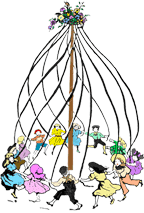L. K. Wood's Sixteenth Annual Threshing Bee
A day at L. K.'s… I suppose this day was the high point of the year for L. K. Wood. As important as May Day is and was to Mendon, we are yet to have over four-thousand people sign in and register for the event. L. K. Wood's annual event grew and grew until it was more like the county fair of our time, with thongs of people from Idaho, Wyoming, Nevada and Utah. People who love steam, steam power and a way of life that was to short, looked forward to each new event. Old timers who ran the machines and once young men who worked the rigs as hands, all longed to see and hear the sights and sounds of live steam. U.S.U. was there as usual and as a sponcer of a sort, exactly why and how I am unsure. I know they wanted to perserve the history and the machines.
It took three to four hours to get all of his working setam engines up to steam and able to move under their own power. A busy time in the morning of fires to start and boilers to fill. Everything had to be made ready for the days work. The grain was bound by a string binder and stacked for use, the horsepower events needed the seat of power staked to the ground and the jack shaft connected to the sepearater. Getting enough teams, five pair, became a problem toward 1966. People just were not keeping work horses as they had in Mendon up until the mid-fifties. But somehow he got enough for a demestration of horsepower. In later times he used a half-scale outfit and small horses, when draft teams could not be found to power the sepeator.
L. K. Wood built and rebuilt threshing equpiment. He had several half-scale working steam engines and built a seperator for it would seem each of them. He had his 1/8 and 1/9 scale models as well, of both horsepower and steam power locomotion. All of his equipment was on display throught the day. L. K. Wood loved to thresh, and it did not take much to get him to start up one or another of his outfits and thresh grain, on any given day in late summer. L. K. Wood loved his steam…
By 1:00 p.m. everything had a full head of steam for the salute of all whistles, and that means all. Wow, what a sound, noise, screach that would be, and as in all things, L. K. Wood went all out for it. Next there was a welcome and U.S.U. would talk of the importance of the history of the day. Then, right to horsepower threshing, I liked this a lot and still favor the memories of it. It seems they always sawed wood which was one of the jobs steam was best at. Next they would have the steam engines climb up out of the nearby creek and show the traction of steam to its best advantage. Then they would take an engine and try to balance it on the teeter-totter, to show the skill of the operator. After this it was on to steam threshing and bundles of grain were pitched into the seperator, to the point of trying to stall it, but never doing so. After this L. K. would put steam power to a sepearter that was built for horsepower, and give the horses a rest. His ten horsepower Russell threshed grain much better than ten head of draft horses, it is easy to see why this method became the way of the future, at the time. Half-scale threshing was next and these were all hand built by L. K. Wood. All of it, the engines and the sepeartors, each and every part. Toward the end of the day they would put a long rope on one of the steam engines and invite all present to try to stop her in a tug of war, steam always won. I pulled for all I was worth, but lost each and every year. Last was a race of gas and steam, steam of course won this as well. You see steam was king and on its day each year, was going to come out on top every time. L. K. had no doubt…
The ward provided refreshments for the guests and used the event as a fund raiser for many projects and events. Parking was a joke. Cars parked around several blocks and several deep to get everyone in. Veda Sorensen said she registered over four-thousand people one year. It was a lot of work by the women of the town to feed such a large group. But they made out ok, and L. K. never charged admission to the event, nor took a cut of the profits. He was willing to let the ward use it as a cash cow for many years.
![]()

![]()
